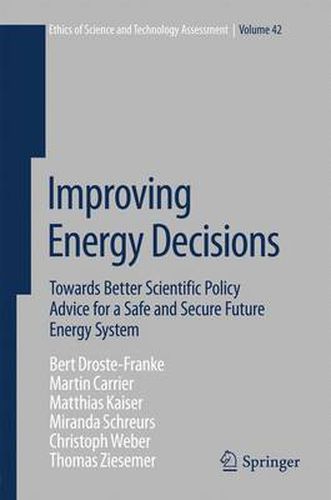Readings Newsletter
Become a Readings Member to make your shopping experience even easier.
Sign in or sign up for free!
You’re not far away from qualifying for FREE standard shipping within Australia
You’ve qualified for FREE standard shipping within Australia
The cart is loading…






This title is printed to order. This book may have been self-published. If so, we cannot guarantee the quality of the content. In the main most books will have gone through the editing process however some may not. We therefore suggest that you be aware of this before ordering this book. If in doubt check either the author or publisher’s details as we are unable to accept any returns unless they are faulty. Please contact us if you have any questions.
Managing a successful transition of the current energy supply system to less carbon emitting options, ensuring a safe and secure supply during the whole process and in the long term, is one of the largest challenges of our time. Various approaches and first implementations show that it is not only technological issue, but also a matter of societal acceptance and acceptability, considering basic ethic values of the society. The main foci of the book are, thus, to develop an understanding about the specific challenges of the scientific policy advice in the area, to explore typical current approaches for the analysis of future energy systems and to develop criteria for the quality assessment and guidelines for the improvement of such studies. The book provides assistance to the interpretation of existing studies and guidelines for setting up and carrying out new analyses as well as for communicating and applying the results. Thereby, it aims to support the involved actors such as the respective scientific experts and researchers as well as decision makers, energy suppliers, stakeholders and the interested public in designing procedures for a successful transition process. The study elaborates consistent interdisciplinary advice as contribution for realising a continuously safe and secure, long-term viable energy supply in spite of diverse interests, multi-level responsibilities, multi-dimensional processes, large uncertainties and lack of knowledge about future developments.
$9.00 standard shipping within Australia
FREE standard shipping within Australia for orders over $100.00
Express & International shipping calculated at checkout
This title is printed to order. This book may have been self-published. If so, we cannot guarantee the quality of the content. In the main most books will have gone through the editing process however some may not. We therefore suggest that you be aware of this before ordering this book. If in doubt check either the author or publisher’s details as we are unable to accept any returns unless they are faulty. Please contact us if you have any questions.
Managing a successful transition of the current energy supply system to less carbon emitting options, ensuring a safe and secure supply during the whole process and in the long term, is one of the largest challenges of our time. Various approaches and first implementations show that it is not only technological issue, but also a matter of societal acceptance and acceptability, considering basic ethic values of the society. The main foci of the book are, thus, to develop an understanding about the specific challenges of the scientific policy advice in the area, to explore typical current approaches for the analysis of future energy systems and to develop criteria for the quality assessment and guidelines for the improvement of such studies. The book provides assistance to the interpretation of existing studies and guidelines for setting up and carrying out new analyses as well as for communicating and applying the results. Thereby, it aims to support the involved actors such as the respective scientific experts and researchers as well as decision makers, energy suppliers, stakeholders and the interested public in designing procedures for a successful transition process. The study elaborates consistent interdisciplinary advice as contribution for realising a continuously safe and secure, long-term viable energy supply in spite of diverse interests, multi-level responsibilities, multi-dimensional processes, large uncertainties and lack of knowledge about future developments.